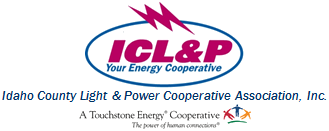Restoring Power Safely and Efficiently
By Abby Berry
We do our best to avoid them, but there’s no way around it: power outages occasionally happen.
For most ICL&P members, outages are rare and only last a few hours. But when major storms, like the ones in December 2021 or January 2022 impact our area, extended outages are unavoidable.
So, when the power goes out, how do ICL&P crews know where to start working? How do you know if your outage has been reported? We’ve got answers to these questions and more, and it all starts with a safe, efficient plan for power restoration.
When the lights go out and it’s safe for our crews to begin the restoration process, they start by repairing power lines and equipment that will restore power to the greatest number of people in the shortest time possible.
This process typically begins with repairs to the larger main distribution lines that service a great number of homes and businesses. After those repairs are made, crews work on tap lines, which deliver power to transformers, either mounted on utility poles (for above-ground service) or placed on pads (for underground service). Finally, individual service lines that run between the transformer and the home are repaired. 
We can’t control the weather, but we can prepare for it. ICL&P keeps a supply of extra utility poles, transformers and other equipment on hand so we can quickly get to work in the event of an outage. When widespread outages occur, multiple crews will be out in the field simultaneously working to repair damage at multiple locations. We also coordinate with nearby co-ops to bring in additional crews when necessary.
A proactive approach to maintenance helps minimize the chance of prolonged outages; this is why you see ICL&P crews periodically trimming trees and clearing vegetation near rights-of-way. We love trees too, but it only takes one overgrown limb to knock out power for an entire neighborhood. Trimming improves power reliability for our entire community. In addition to managing vegetation, we regularly inspect utility poles, power lines and other critical equipment to maintain a more reliable system.
If you experience a power outage, don’t assume a neighbor reported it. It’s best to report the outage yourself, and we make it easy to do. The quickest way to report an outage is to call our outage reporting number at (208)983-1610.
If you have a medical condition that requires electrical equipment, please let us know, and always have a backup plan in place. This plan could include a portable generator, extra medical supplies or moving to an alternate location until power is restored. If you plan to use a generator for backup power, read all safety information and instructions before use.
Mother Nature can be unpredictable, but as a member of ICL&P, you can feel confident knowing we’re standing by, ready to restore power as quickly and safely as possible.
Abby Berry writes on consumer and cooperative affairs for the National Rural Electric Cooperative Association, the national trade association representing more than 900 local electric cooperatives. From growing suburbs to remote farming communities, electric co-ops serve as engines of economic development for 42 million Americans across 56% of the nation’s landscape.
